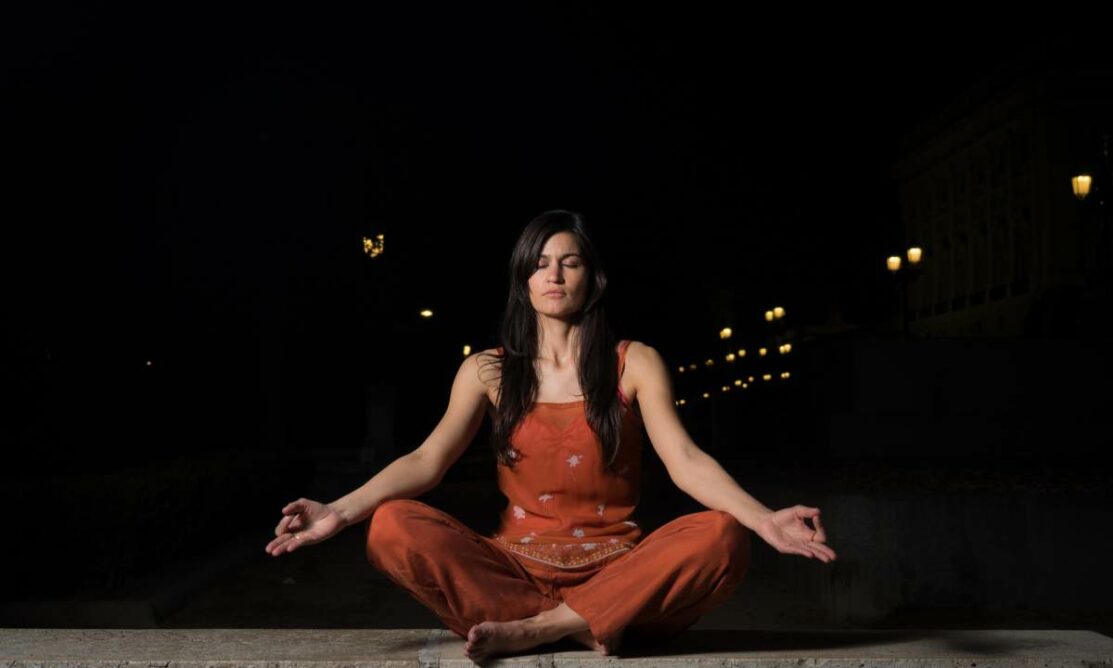Meditation is a great way to relax and reduce stress, but it is important to be aware of the potential risks of meditating at night.
While meditating at night can be beneficial in some cases, it can also lead to insomnia, anxiety, and other negative effects.
This article will discuss why you should not meditate at night and provide tips for getting the most out of your meditation practice.
Meditating at Night Interferes with Sleep
Meditating at night can interfere with your sleep. It’s important to be aware of this if you’re considering meditating before bed.
Meditation can be a great way to relax and clear your mind before bed, but it can also have the opposite effect.
When you meditate, your body and mind become more alert and focused. This can make it harder to fall asleep and stay asleep.
Additionally, meditating at night can cause your body to produce more cortisol, a hormone that helps regulate your sleep-wake cycle.
Too much cortisol can make it harder to fall asleep and stay asleep.
Finally, meditating at night can cause your body to produce more adrenaline, a hormone that helps you stay alert and focused. This can make it harder to relax and drift off to sleep.
If you’re considering meditating at night, it’s important to be aware of the potential effects it can have on your sleep.
It’s best to meditate earlier in the day or in the afternoon when your body and mind are more relaxed. This will help you get a better night’s sleep.
Meditating at Night Increases Anxiety

Meditating at night can actually increase anxiety levels for some people. While it’s true that meditation can help reduce stress and anxiety, it’s important to understand that it can have the opposite effect for some people. If you’re someone who struggles with anxiety, it’s best to avoid meditating at night.
For starters, meditating at night can make it harder to fall asleep. When you meditate, your body and mind become more alert and aware.
This can make it difficult to relax and drift off to sleep.
Additionally, meditating at night can cause your mind to become more active.
This can lead to racing thoughts and worries that can make it difficult to relax and get a good night’s sleep.
Finally, meditating at night can cause you to become more aware of your physical sensations. This can lead to increased anxiety as you become more aware of your body’s physical reactions to stress.
If you’re someone who struggles with anxiety, it’s best to avoid meditating at night. Instead, try meditating during the day when you’re more likely to be relaxed and alert.
This will help you get the most out of your meditation practice and reduce your anxiety levels.
Meditating at Night Causes Stress
Meditating at night can be a great way to relax and unwind after a long day, but it can also cause stress if done incorrectly. While meditating can be a great way to reduce stress and anxiety, it can also have the opposite effect if done too late in the evening.
When meditating at night, it’s important to be mindful of the time. If you meditate too close to bedtime, it can actually increase your stress levels. This is because meditation can be energizing and can make it harder to fall asleep. It can also cause your mind to become overstimulated, making it difficult to relax and drift off to sleep.
It’s also important to be mindful of the type of meditation you’re doing. If you’re doing a more active form of meditation, such as guided visualization or mantra meditation, it can be more stimulating and energizing than a more passive form of meditation, such as mindfulness or breath awareness. This can make it harder to relax and fall asleep.
Finally, it’s important to be mindful of your environment when meditating at night. Make sure the room is dark and quiet, and that there are no distractions. This will help you stay focused and relaxed during your meditation session.
In conclusion, meditating at night can be a great way to relax and unwind after a long day, but it’s important to be mindful of the time, type of meditation, and environment.
If done correctly, meditating at night can be a great way to reduce stress and anxiety. However, if done too late in the evening or with the wrong type of meditation, it can actually increase your stress levels and make it harder to fall asleep.
Meditating at Night Leads to Nightmares
Do you find yourself waking up in the middle of the night after a nightmare? If so, you may want to consider if meditating before bed could be the cause. While meditating can be a great way to relax and clear your mind, it can also lead to nightmares if done at night.
Meditation is a practice of focusing your attention and awareness on the present moment. It can help you relax and reduce stress, but it can also lead to nightmares if done too close to bedtime.
When you meditate, your mind is more open and vulnerable to the subconscious. This can lead to nightmares if you are not careful.
If you are prone to nightmares, it is best to avoid meditating at night. Instead, try meditating during the day or in the early evening. This will give your mind time to process the thoughts and feelings that come up during meditation before you go to bed.
It is also important to make sure you are in a relaxed state before you meditate. If you are feeling stressed or anxious, it can be difficult to relax and focus on the present moment. Take some time to do some deep breathing or other relaxation techniques before you begin your meditation.
Finally, make sure you are in a comfortable environment when you meditate. If you are in a noisy or uncomfortable space, it can be difficult to focus and relax. Find a quiet, comfortable place to meditate and make sure you are comfortable before you begin.
Meditating can be a great way to relax and clear your mind, but it can also lead to nightmares if done at night.
If you are prone to nightmares, it is best to avoid meditating at night and instead tries meditating during the day or in the early evening. Make sure you are in a relaxed state and comfortable environment before you begin your meditation.
Meditating at Night Increases Heart Rate if done incorrectly
Meditating at night can be a great way to relax and unwind after a long day, but if done incorrectly, it can actually increase your heart rate. That’s because when you meditate, your body relaxes and your heart rate slows down. But if you’re not careful, you can end up overstimulating your body and increasing your heart rate.
To avoid this, make sure you’re in a comfortable position and that you’re not too close to any bright lights or loud noises. It’s also important to focus on your breathing and to keep your thoughts from wandering. If you find yourself getting distracted, take a few deep breaths and refocus.
Finally, don’t meditate for too long. If you’re just starting out, try meditating for five to ten minutes at a time. As you get more comfortable, you can gradually increase the length of your meditation sessions.
Meditating at night can be a great way to relax and unwind, but it’s important to do it correctly. If you follow these tips, you can enjoy the benefits of meditation without increasing your heart rate.
Meditating at Night is Unsuitable for People with Mental Health Conditions
Meditating at night can be a great way to relax and unwind after a long day, but it may not be suitable for everyone.
People with mental health conditions should be aware that meditating at night can be counterproductive and even potentially harmful.
For people with mental health conditions, nighttime can be a particularly difficult time. It can be a time of increased anxiety, intrusive thoughts, and difficulty sleeping. Meditating at night can exacerbate these symptoms, as it can be difficult to focus on calming thoughts and relax when your mind is already in a heightened state.
Additionally, meditating at night can make it harder to fall asleep. Meditation can be energizing, and if you’re already having difficulty sleeping, it can make it even harder to drift off.
If you have a mental health condition and are considering meditating at night, it’s important to talk to your doctor or therapist first. They can help you decide if it’s a good idea for you and provide guidance on how to do it safely.
In general, it’s best to avoid meditating at night if you have a mental health condition. Instead, focus on calming activities that don’t require intense focus, such as reading, listening to music, or taking a warm bath.
These activities can help you relax and prepare for a good night’s sleep.
Meditating at Night Can Lead to Sleep Disorders
Meditation is a common practice for many people who are looking for a way to relax and reduce stress. However, engaging in meditation at night can lead to sleep disorders.
The problem with meditating at night is that it can create an imbalance in the body’s natural circadian rhythm. This can disrupt sleep patterns and make it difficult to fall asleep or achieve restful sleep.
The stimulation caused by meditating too close to bedtime can also prevent you from being able to switch off once you’re trying to go to sleep.
If you are looking to engage in mindfulness activities such as meditation, it’s best to avoid practicing it at night and instead focus on a time earlier in the day.
Doing this will help your body naturally wind down come nighttime and create a better balance for getting a good night’s rest. Alternatively, if you feel the need for some relaxation before bed then try activities like reading, journaling, or taking a warm shower instead of meditating.
Getting quality sleep is essential for both physical and mental well-being so if you start noticing any signs of disturbed sleep patterns, take the time to look into why that might be happening and adjust accordingly.
Meditation is an important tool but when practiced too close to bedtime it can lead to negative consequences – so remember: save meditation for the morning!
Meditating at Night Can Cause Physical Discomfort
Meditating at night can cause physical discomfort. If you’re considering meditating at night, it’s important to be aware of the potential physical discomfort that can come with it.
For starters, meditating at night can cause your body to become tense. This is because your body is already in a relaxed state when you go to bed, so when you start meditating, your body may not be used to the sudden change in activity. This can lead to muscle tension, headaches, and even neck and shoulder pain.
Another issue is that meditating at night can disrupt your sleep. When you meditate, your body releases hormones that can make it difficult to fall asleep. This can lead to insomnia, which can have a negative impact on your overall health.
Finally, meditating at night can cause your body to become overheated.
This is because your body is already in a relaxed state, so when you start meditating, your body may not be used to the sudden increase in temperature. This can lead to sweating, dizziness, and even nausea.
Overall, meditating at night can cause physical discomfort. If you’re considering meditating at night, it’s important to be aware of the potential physical discomfort that can come with it.
It’s also important to make sure that you’re getting enough sleep and that you’re not overworking your body.
Conclusion
In conclusion, it is not recommended to meditate at night due to the potential for increased anxiety and difficulty sleeping.
Meditating during the day can help to reduce stress and improve focus, while nighttime meditation can lead to restlessness and difficulty sleeping.
Therefore, it is best to meditate during the day and save nighttime for winding down and preparing for sleep.



